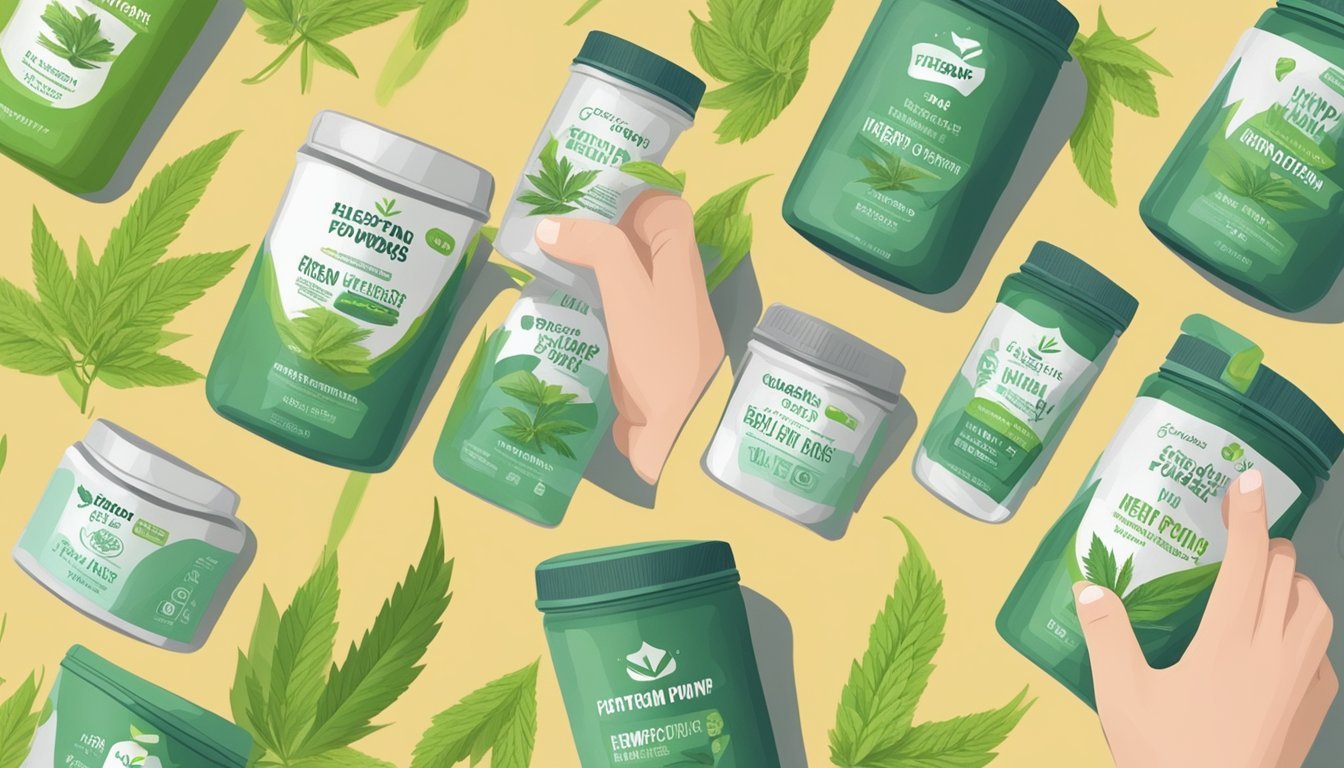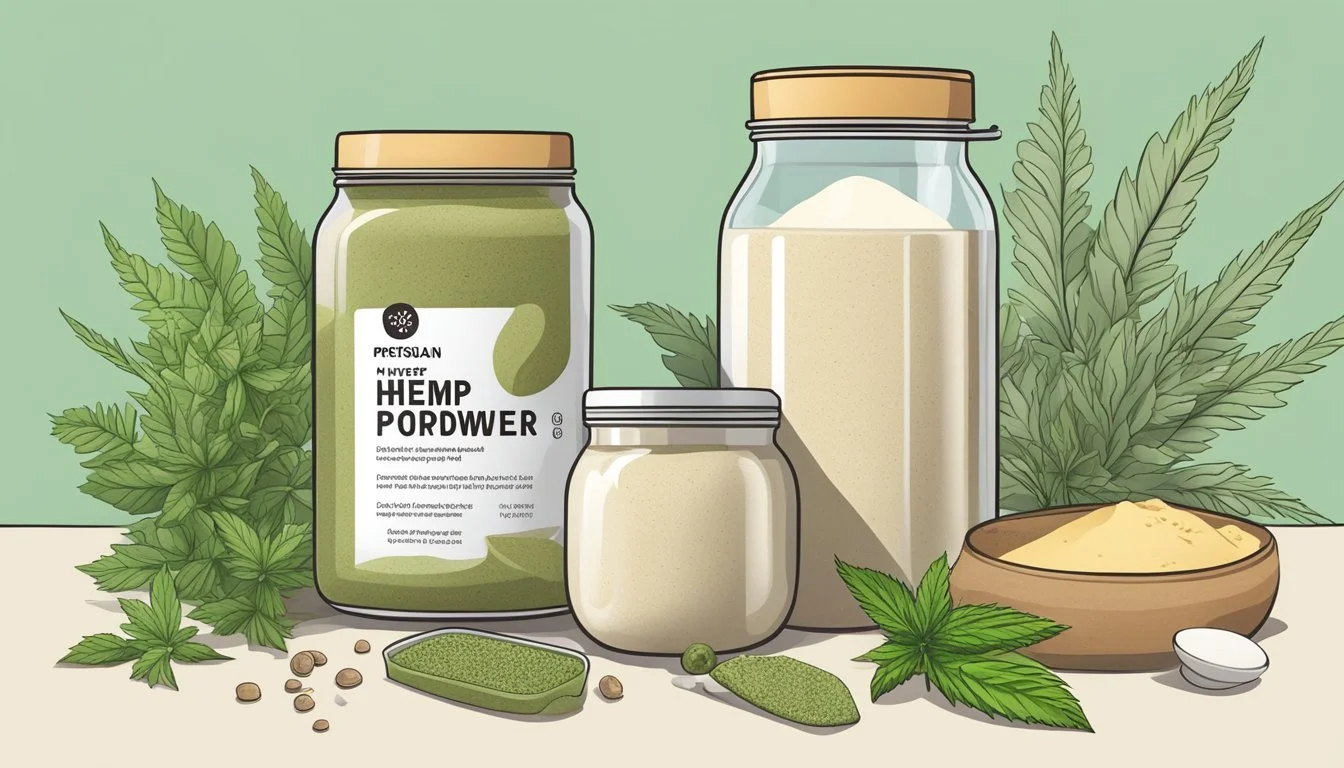Is Hemp Protein Powder Vegan?
Uncovering the Plant-Based Truth
Hemp protein powder is a plant-based supplement that is indeed vegan. Derived from the seeds of the hemp plant, it serves as a nutritious vegan alternative to animal-derived protein sources. Rich in essential amino acids, hemp protein powder supports everyday health and wellness, catering to those who follow a plant-based diet. As it contains all nine essential amino acids, it is a complete protein—a rare quality among plant proteins—which makes it particularly beneficial for vegans and vegetarians who may need to pay extra attention to their intake of these crucial building blocks.
The production of hemp protein involves minimal processing. The seeds of the hemp plant are cold-pressed to remove the oil, and the remaining seed cake is then milled into a fine powder. This low level of processing helps retain most of the natural nutrients found in the seeds, such as fiber, healthy fats, and a variety of minerals, further solidifying its reputation as a wholesome supplement.
Protein powders are a convenient way to directly increase protein intake, especially for those with dietary restrictions such as vegans. Hemp protein powder's nutritional profile not only benefits muscle repair and growth but also supports a balanced diet. Although it is plant-based, it's comparable to other high-quality protein sources in terms of its amino acid composition and nutrient density, confirming its viability as a vegan-friendly protein option.
What Is Hemp Protein Powder?
Hemp protein powder is a nutrient-rich dietary supplement made from the seeds of the hemp plant. It offers a high-quality protein source that is also rich in essential fatty acids and dietary fiber.
Origins of Hemp Protein
Hemp protein is derived from Cannabis sativa, the same species associated with marijuana; however, it contains only trace amounts or no tetrahydrocannabinol (THC), the psychoactive component. The production of hemp protein powder involves cold-pressing the seeds to remove the oil, followed by milling and grounding the residue into a fine, protein-rich powder.
Hemp Protein Composition
The composition of hemp protein is noteworthy for its completeness:
Protein: Hemp contains all nine essential amino acids necessary for the human diet, making it a complete protein source.
Fiber: It is high in dietary fiber, which aids in digestion.
Fatty Acids: Hemp protein includes a balanced ratio of omega-3 and omega-6 fatty acids.
Minerals: It's a good source of minerals such as iron, magnesium, and manganese.
Nutrients: The powder also offers various other beneficial nutrients and antioxidants.
This nutritional profile emphasizes hemp protein's role as a digestible, plant-based protein supplement that supports overall well-being.
Benefits of Hemp Protein for Vegans
Hemp protein powder stands out as a plant-based supplement that excels in providing vegans with a rich source of essential nutrients vital for maintaining a balanced diet. It constitutes a powerful ally for those looking to enrich their vegan lifestyle with a blend of necessary amino acids, minerals, and other health-promoting components.
Complete Protein Source
Hemp protein is esteemed for being a complete protein, encompassing all nine essential amino acids that the human body cannot produce on its own. This is particularly beneficial for vegans, whose protein intake is limited to plant-based sources. A single serving can significantly contribute to their daily protein requirements.
Amino Acid Profile of Hemp Protein:
Histidine
Isoleucine
Leucine
Lysine
Methionine+Cystine
Phenylalanine+Tyrosine
Threonine
Tryptophan
Valine
Digestibility and Nutrient Absorption
Another advantage is the digestibility of hemp protein. It is easily broken down by the body, allowing for efficient nutrient absorption. Additionally, its high fiber content aids in digestion, which can be a critical aspect for those following a vegan diet seeking to optimize nutrient uptake.
Digestibility Factors:
Easily broken down
High fiber content
Impact on Heart Health and Muscle Mass
For cardiovascular and muscle support, hemp protein is an excellent source of omega-3 fatty acids and essential fatty acids, which are known to benefit heart health. These nutrients, alongside the substantial protein content, also play a crucial role in maintaining and building muscle mass, making hemp protein a valuable supplement for vegan athletes and fitness enthusiasts.
Key Nutrients for Cardiovascular and Muscle Health:
Omega-3 fatty acids
Essential fatty acids
Iron
Magnesium
Zinc
Through its complete protein profile, easy digestibility, and heart-healthy ingredients, hemp protein serves as a powerful tool for vegans to enhance their nutrition and support their overall health.
Comparing Hemp Protein to Other Plant-Based Proteins
When examining hemp protein powder as a vegan supplement, it's important to understand its nutritional profile in comparison to other plant-based proteins such as soy, pea, and rice proteins. These comparisons focus on their protein content, nutritional benefits, and digestibility.
Hemp vs. Soy Protein
Hemp protein is derived from the seeds of the hemp plant and contains all nine essential amino acids, although it is relatively low in lysine. In contrast, soy protein comes from soybeans and is also a complete protein, providing ample amounts of lysine, which can make it more balanced in terms of amino acid profile. Both are viable plant-based options, but soy protein typically contains more protein per serving and is higher in calcium.
Hemp Protein:
Complete protein but low in lysine
Not as high in protein per serving
Lower in calcium
Soy Protein:
Complete protein with a balanced amino acid profile
Higher in protein per serving
Rich in calcium
Hemp vs. Pea Protein
Pea protein is another popular plant-based protein powder made from yellow split peas. Like hemp protein, pea protein is rich in protein and boasts a good nutritional profile, though it is not a complete protein due to lower levels of some amino acids such as methionine. Pea protein is often cited for its high digestibility and is a good source of iron. Hemp protein, while also easily digestible, provides a broader spectrum of nutrients including both protein and fiber, but may have lower protein content per serving compared to pea protein.
Hemp Protein:
Good nutrient spectrum: protein and fiber
Moderately digestible
Pea Protein:
High in protein with a focus on digestibility
Rich in iron, but not complete in amino acids
Hemp vs. Rice Protein
Rice protein powder is typically made from brown rice and is another alternative plant-based protein. It's considered an incomplete protein, lacking in some essential amino acids, especially lysine, like hemp protein. However, hemp protein still has a more balanced amino acid profile overall and includes beneficial fibers and fatty acids. Rice protein can be preferable for those who seek a plant-based protein with lower allergenic potential and is often combined with other plant-based proteins to improve its amino acid profile.
Hemp Protein:
More balanced amino acid profile than rice protein
Contains beneficial fibers and fatty acids
Rice Protein:
Incomplete protein, particularly low in lysine
Less allergenic and commonly mixed with other proteins
Taste and Texture Profiles
When considering hemp protein powder, consumers will find that its taste and texture are distinct from other vegan protein powders. Its natural earthy and nutty flavors are versatile, easily adapting to various culinary uses.
Flavor Variations
Hemp protein powder typically possesses a mild, nutty flavor that can range from slightly grassy to creamy depending on the brand. It often comes in unflavored varieties that retain the natural taste of hemp seeds. For those who prefer flavored options, variations include chocolate, vanilla, and sometimes even berry. These flavored powders may introduce a slight tartness to shakes or smoothies, appealing to different palates.
Unflavored: Earthy, nutty
Chocolate: Rich, with undertones of hemp
Vanilla: Sweet, creamy
Berry: Fruity, slightly tart
Cooking and Blending Techniques
The texture of hemp protein powder is generally more grainy or gritty compared to other plant-based proteins, which is noticeable when mixed with water. It can be incorporated into shakes and smoothies to add a dense texture, and it blends best when combined with ingredients like bananas or avocados that smooth out the graininess. Hemp protein can also be used in pancake batter or baked goods to boost protein content without significantly altering the dish's flavor.
Shakes/Smoothies: Blend with creamy fruits for best texture
Pancakes: Mix into batter for added protein with minimal flavor change
Usage and Servings
Hemp protein powder is a complete, plant-based protein supplement ideal for vegans, often used to meet daily protein requirements and enhance dietary fiber intake.
Recommended Protein Intake for Vegans
For vegans, getting adequate protein is crucial, as plant-based diets can sometimes lack sufficient protein. Adults should aim for a daily intake of 0.8 grams of protein per kilogram of body weight, while vegan athletes may require 1.2 to 2.0 grams per kilogram to support increased demands from exercise. Hemp protein powder, with its 15 grams of protein per 30-gram serving, can be a valuable contribution to a vegan's protein intake.
Incorporating Hemp Protein into Diets
Vegans can easily incorporate hemp protein powder into their diet by adding it to smoothies, shakes, or protein bars. Its nutty flavor complements both sweet and savory dishes. For example:
Morning smoothie: Blend 30 grams of hemp protein powder with a banana, a cup of almond milk, and a handful of spinach.
Post-workout shake: Mix hemp protein with water or plant-based milk after exercise to aid recovery.
Snack: Sprinkle hemp protein over oatmeal or mix into homemade snack bars for an afternoon boost.
This versatile protein powder not only supports muscle repair and growth but also adds dietary fiber to a vegan diet, making it a multifunctional supplement.
Safety and Side Effects
When considering hemp protein powder as a vegan supplement, individuals should be aware of its safety profile and potential side effects, particularly regarding the digestive system and the importance of consulting healthcare professionals.
Digestive Considerations
Hemp protein is generally well-tolerated but can be associated with certain digestive issues such as gas and bloating, predominantly due to its high fiber content. The fiber in hemp protein aids digestion but can also lead to discomfort, especially for those not accustomed to a high-fiber diet.
Common Side Effects:
Gas
Bloating
Consumers are advised to gradually introduce hemp protein into their diet to allow the digestive system to adjust. Additionally, staying hydrated can help mitigate some of these effects.
Consulting with Healthcare Professionals
Before adding a new supplement like hemp protein to one’s diet, consulting with a healthcare provider or a registered dietitian is recommended, especially for individuals with pre-existing health conditions or those on medication.
Healthcare Consultation Importance:
Risks: Assess any potential risks specific to the individual.
Immune System: Understand possible effects on the immune system.
A healthcare professional can provide personalized advice, ensuring that the supplement supports the individual's nutrition goals without adverse effects on their health.
Selecting Quality Hemp Protein Powders
When selecting a high-quality hemp protein powder, the savvy consumer looks for products that align with their dietary preferences and values, such as organic certification and simple, wholesome ingredients without fillers or artificial additives.
Organic and Non-GMO Options
Organic hemp protein powders offer a premium option for those who prefer supplements free from synthetic pesticides and fertilizers. Companies like Nutiva and Manitoba Harvest produce hemp protein powders that are not only organic but also non-GMO, ensuring that the hemp plants used have not been genetically modified. These options are appealing for individuals seeking products that support sustainable agricultural practices.
Certified Organic: Look for powders with a "certified organic" seal to guarantee compliance with organic standards.
Non-GMO Project Verified: This additional certification ensures the absence of genetically modified organisms.
Understanding Labels and Ingredients
Reviewing labels and understanding ingredients is crucial when choosing a hemp protein supplement to ensure that the product is as close to its natural form as possible.
Supplement Facts:
Protein Content: A typical hemp protein powder offers around 13 to 15 grams of protein per 30-gram serving.
Fiber: Hemp protein naturally contains dietary fiber, typically around 1 gram per serving.
Ingredients:
Pure and Simple: Aim for powders with no additional ingredients or fillers. Powders should list hemp protein concentrate as their primary ingredient.
Sweeteners: Some brands may use natural sweeteners like stevia to enhance flavor without adding refined sugars.
Additional Additives:
Avoid products with artificial sweeteners or flavors.
Sunwarrior brand incorporates medium-chain triglycerides (MCTs) and coconut, which are valued for their health-promoting properties and may improve the overall taste and mixability.
Mineral Content: A quality hemp protein powder can provide valuable minerals such as zinc and copper that support various bodily functions.
By carefully examining products for organic certification, clean labels, and nutritional value, consumers can choose a hemp protein powder that not only meets their dietary needs but also aligns with their health and environmental values.
Environmental Impact of Hemp Protein
Hemp protein offers a significant environmental advantage due to its sustainable cultivation methods. This plant-based supplement represents a notable shift in dietary choices towards a more eco-conscious approach.
Cultivation and Sustainability
Hemp, a variety of the Cannabis plant, is renowned for its sustainability. It thrives in a range of climates and soil types, often requiring fewer water resources compared to other crops. Hemp's hardiness translates to a minimal need for chemical pesticides or fertilizers, reducing environmental toxins.
Rapid Growth: Hemp plants grow quickly, which means they can be harvested several times throughout the year.
Soil Health: They contribute positively to soil health by preventing erosion and naturally enriching the soil with nutrients.
Water Usage: Hemp is comparatively low in water requirements, allowing for conservation of this critical resource.
These aspects highlight hemp as a viable and eco-friendly source of protein powder for those adhering to a plant-based diet or looking for sustainable supplements.
Consumer Considerations
When selecting a vegan protein powder, consumers should prioritize nutritional content, value for money, and the integrity of product reviews. It's critical to consider both cost efficiency and the credibility of brand comparisons.
Cost and Availability
Hemp protein powder is generally more expensive than non-vegan proteins but compares favorably with other vegan protein sources. Its cost reflects its nutritional value and the more complex processing required for plant-based proteins. Availability can vary, with some brands being commonly found in health food stores and larger supermarkets, while others might be more niche and only available online or in specialized stores.
Average Price Range: Depending on the brand, consumers can expect to pay between $10 to $30 per pound.
Online vs. Retail: Prices and availability may differ; some consumers may find better deals and a wider selection online.
Brand Comparisons and Reviews
Expert reviews and customer feedback are invaluable when assessing the numerous hemp protein products on the market. Not all hemp proteins are created equal; they can differ significantly in terms of nutrition, flavor, and mixability.
Nutrition: Consumers should look for a high protein content per serving, typically around 15 grams, and a good balance of essential fatty acids.
Brand Reputation: Established brands with transparent sourcing and manufacturing processes are often more reliable.
Customer Reviews: These provide insight into taste and mixability, which can be deciding factors for many consumers.
Additional Recipes and Uses
Hemp protein powder is a versatile ingredient that can be incorporated into various recipes to boost protein intake. The powder is derived from the seeds of the hemp plant, ensuring it's a vegan-friendly option. Below are practical ways one can use hemp protein powder in their dietary regime:
Smoothies and Shakes: Hemp protein is commonly added to smoothies and shakes. For a simple blend, one can combine a scoop of hemp protein powder with a banana, a handful of spinach, almond milk, and a dash of cinnamon for a nourishing drink.
Protein Bars: Homemade hemp protein bars are an easy, on-the-go snack option. Ingredients often include hemp protein, almonds or almond butter, dates for natural sweetness, and a touch of cinnamon. These can be mixed and chilled for a no-bake nutritional boost.
Recipe Ingredients Hemp Seed Milk Hemp protein, water Chocolate Hemp Smoothie Hemp protein, cocoa powder, chocolate almond milk, non-dairy cream, dates Almond Hemp Protein Bars Hemp protein, almonds, dates, nut/seed butter, cinnamon
Protein Additive: Hemp protein can also be sprinkled into oatmeal, yogurt, or baked goods for an added protein punch without significantly altering the taste. A scoop or two can be included in pancake batter or mixed into homemade bread dough, for example.
With a neutral flavor, hemp protein complements most ingredients in recipes. Whether included in a hearty breakfast, a midday snack, or a post-workout shake, hemp protein powder is both a practical and healthful vegan protein source.
Subsections
Hemp Protein Powder Characteristics
Hemp protein powder is derived from the seeds of the hemp plant, Cannabis sativa. It's an excellent source of protein for vegans, offering a plant-based alternative that aligns with a vegan diet. The powder typically contains:
Protein Content: Approximately 15 grams of protein per 30-gram serving, although this may vary among brands.
Fiber: Provides dietary fiber, contributing to digestive health.
Fatty Acids: Rich in health-promoting omega-3 and omega-6 fatty acids.
Vegan Considerations
Hemp protein powder is naturally:
Plant-Based: Originates from a vegan-friendly source, the seeds of the hemp plant.
Dairy-Free: Contains no animal by-products, making it suitable for lactose-intolerant individuals and vegans.
Soy-Free: A viable option for those looking to avoid soy, common in many vegan proteins.
Nutritional Profile
In addition to protein, hemp protein powder provides:
BCAAs: Contains branched-chain amino acids essential for muscle repair and growth.
Minerals: Supplies important minerals such as iron, magnesium, and zinc.
Vitamins: Offers a range of vitamins, including vitamin E and some B vitamins.
Sustainability
Hemp is known for its:
Eco-Friendliness: Hemp cultivation requires less water and processing compared to other protein sources.
Soil Health: The hemp plant contributes to soil health, enhancing the sustainability of agriculture.










